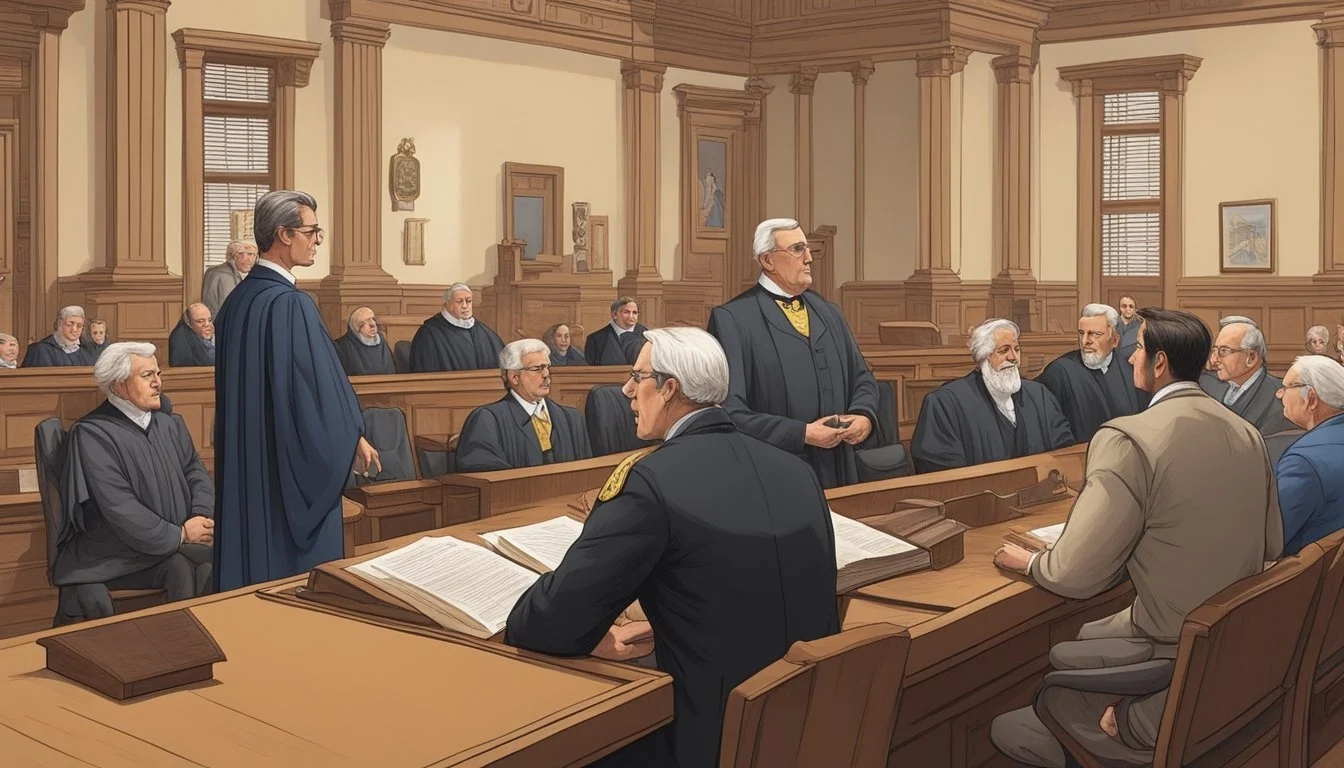German Texan Contributions to Texas Law and Jurisprudence
A Legacy of Influence
The intersection of German heritage and Texan law has provided a unique cultural and legal tapestry within the state of Texas. Since their arrival in the early 19th century, German Texans have made significant contributions to the legal and jurisprudential landscape of the region. They brought with them ideas of governance and civic engagement that would eventually permeate into the creation and interpretation of laws in Texas. This involvement was particularly evident by 1846, with the establishment of a German language version of Texas law, underscoring the commitment to ensure the inclusion of the German-speaking population in the legal process.
Their influence extended into politics where several German Texans held office, including terms in the Texas Senate, highlighting their integration and impact on Texas governance. The war for Texas independence and the Civil War saw participation from Germans on various fronts, notwithstanding their complex positioning during the latter conflict. The German contribution is also marked by a commitment to civil liberties, although this was challenged during times of national strain, as seen during the First World War.
This foundational role played by German Texans has shaped not only the state's laws but also its justice system over the years. Reflecting on these myriad effects offers a nuanced understanding of the intertwined legal histories of German immigrant communities and the Lone Star State.
Historical Context of German Immigration to Texas
In the early 19th century, Texas attracted a significant number of German immigrants. This migration commenced with the arrival of Johann Friedrich Ernst, the so-called "Father of German Immigration to Texas," in 1831. He received a land grant in present-day Austin County and wrote letters back to Germany extolling the virtues of Texas, which incited a wave of German emigration.
Texas Hill Country, including areas like Fredericksburg, New Braunfels, and Comfort, became central points of German settlement. The Adelsverein, formally known as the Society for the Protection of German Immigrants in Texas, was created by German nobles in 1842 to establish a new "Germany within Texas." Fredericksburg and New Braunfels became notable settlements established by this society.
The emigrants often arrived through Galveston or New Orleans, moving inland to find their new homes. Many were peasants seeking relief from economic hardships in their homeland. They engaged in a practice known as chain migration, where established immigrants assisted relatives and friends to migrate.
German-Texans, having settled in Gillespie County and other counties in Central Texas, played an important part in the agricultural and political development of these areas. In particular, they established thriving communities along the Llano and Guadalupe rivers.
Land grants from Mexico and the subsequent Republic of Texas before annexation by the United States provided opportunities for these German settlers to establish a presence in the region. Their impact is evidenced in names like Luckenbach and institutions like the King Ranch. Their presence also led to the unique cultural region within the Texas Hill Country known as the German Belt.
This wave of German migration provided Texas with a distinct cultural and legal heritage that has woven into the state's diverse tapestry. German influence in Texas law and jurisprudence can often be traced back to these early settler communities.
Impact of German Texan Culture on State Identity
The German Texan legacy is interwoven with the fabric of Texas's legal and cultural tapestry, having had a significant impact on the state's identity through music, language, and education.
Influence on Texas Music and Festivals
German Texans have left an indelible mark on Texas music, infusing it with unique sounds reflective of their heritage. New Braunfels and Muenster are exemplary, hosting annual festivals such as Wurstfest and Oktoberfest, drawing crowds eager to experience the vibrant echoes of German folk music. Traditional polkas and waltzes blend seamlessly with local genres, symbolizing the melding of German and Texan cultures.
Key Festivals:
Wurstfest: A celebration of German culture through music, food, and dance.
Oktoberfest: An annual festival held in multiple Texas towns, celebrating German heritage.
Preservation and Integration of German Language
Once a prevalent force in Texas's linguistic landscape, the German language has seen continuous efforts for preservation and integration. Texas German, a unique dialect developed in Texas, highlights the linguistic adaptation of German settlers. Communities like New Braunfels and Schulenburg showcase street signs and public messages in both English and German, maintaining a bilingual environment. The University of Texas at Austin remains a pivotal institution for German studies, furthering the academic preservation of the language.
Key Language Contributions:
Bilingual Signage: Reflective of the dual-language environment in historic settlements.
Academic Programs: Encouraging the study and longevity of German language and culture.
German Texans in Literature and Education
German literature has influenced Texan education, with numerous books by German authors or about German Texans incorporated into curricula across the state. Moreover, these works illuminate the experiences and perspectives of the German immigrant community, portraying both their contributions and the prejudice they sometimes faced. Educational institutions, including the University of Texas at Austin, offer courses dedicated to German literature, reflecting the respect and recognition of German Texan influence.
Key Educational Aspects:
German Literature: Studied for its cultural and historical significance in Texas schools.
Ethnic Studies: German Texans are acknowledged as one of Texas's prominent ethnic groups, featuring in broader discussions of the state's diverse history.
Legal and Political Contributions of German Texans
German Texans have had a significant impact on the legal and political landscape of Texas. Their involvement has shaped state governance and taken clear stances on various legal issues from the Civil War era to the civil rights movement.
From Civil War to Civil Rights: Legal Stances of German Texans
The German Texan communities often took a distinctive stand on legal issues. During the Civil War, despite Texas joining the Confederacy, many German Texans maintained Unionist sympathies. This tension led to difficult circumstances, particularly along the frontier, as they navigated a delicate position between Confederate laws and their own beliefs in civil liberties. Their advocacy for civil rights continued well into the 20th century, often aligning with broader movements that pushed for equal rights and justice within Texas and across the nation.
German Texans in State Governance
German Texan influence extended into state governance with their contributions being felt in policy and law-making. They actively participated in politics, and by the year 1846, a German language version of Texas law was in place, reflecting their significant presence. The presence of a German Texan, such as John O. Meusebach who began his term as a Texas senator in 1851, highlights the integration and influence of the German community within Texas politics. It was through such representation that German Texans influenced legislation and policy, contributing to the shaping of a legal environment that reflected a growing and diverse Texas population.
German Texan Influence on Texas Jurisprudence
The notable contributions of German Texans to Texas law and jurisprudence have had lasting effects, particularly through influential figures, the legacy of legal traditions, and property law developments.
Notable German Texan Figures in Law
German Texans have been pivotal in shaping Texas law. John O. Meusebach, founder of the Verein that established German communities in Texas, not only actively engaged in Texas politics but also served as a Texas senator in 1851. His legacy in Texas law is marked by his advocacy for German Texans' rights and interests.
Legacy of German Legal Traditions
German legal traditions infused Texas law with a distinct flavor. For instance, in 1846, German language versions of Texas laws were created to accommodate the significant German-speaking population. The University of Texas has preserved a wealth of resources, including photographs and legal documents, which showcase the rich tapestry of German contributions to the state's legal practices.
German Texans and Property Law
German Texans played a role in the development of property laws. Communities like Fredericksburg and New Braunfels are examples where German Texan settlers implemented systems of land ownership and inheritance, which became interwoven with the wider Texan legal framework around property rights and land usage.
German Texans and the Development of Texas Cities
The fabric of Texan urban development is interwoven with the cultural, economic, and legal contributions of German Texans. These communities helped shape the state's cities from their legal systems to their unique cultural landscapes.
San Antonio: A Nexus of German Texan Cultural Exchange
San Antonio served as a focal point where German settlers significantly impacted local culture and industry. By the mid-19th century, German influence in San Antonio was palpable, with the establishment of various businesses, cultural societies, and social clubs. These institutions were a testament to the German Texan commitment to enhancing the city's economic and cultural landscape. Moreover, they laid the groundwork for a blended culture within the bustling urban environment, which persists today.
German Texan Settlements in Rural Areas
Beyond the cities, German Texans founded settlements in Central Texas' rural areas, like Gillespie County, home to Fredericksburg. This settlement became a microcosm of German heritage within Texas, emphasizing self-sufficiency and community. In New Braunfels and Boerne, similarly, German immigrants cultivated thriving communities that leveraged local resources to foster agricultural and industrial growth. These rural establishments often acted as a springboard for German Texans' integration into urban settings.
Urbanization and German Texan Businesses
The urbanization of Texas saw German Texan businesses flourish, particularly in areas like Galveston and Central Texas, which became economic hubs for the state. German-run industries contributed greatly to the economic landscape, from retail to banking. In Austin County and Muenster, German Texans leveraged their entrepreneurial skills to facilitate the development of vibrant urban economies, punctuating the Texas commercial scene with their distinctive European influence.
Conclusion
German Texans made significant contributions to the development of Texas law and jurisprudence. By the mid-19th century, the influence of German immigrant communities was evident, with Texas laws being published in the German language to accommodate the growing population. Such an inclusive approach indicated recognition and respect for the role German Texans would play in shaping the state's legal landscape.
Education was a valued aspect of German Texan heritage, leading to advocacy for German language and culture in local schools. However, legislative shifts, particularly during World War I, such as the passing of House Bill 304, reflected broader social pressures and restricted the use of German in public education.
German Texans actively engaged in political life in Texas. Notable individuals, such as Meusebach, who served as a Texas senator, exemplify the community's commitment to public service and governance. Despite facing tensions during the Civil War, where allegiances were split, their contributions to lawmaking remained significant.
Today, the imprint of German Texans in the legal domain has evolved with their descendants entering a wide array of professions across Texas. Their early participation set a precedent for the acknowledgement of diverse cultural heritages in the state’s legal system. The German Texan experience underscores the importance of immigrant contributions to the collective jurisprudence of Texas.





